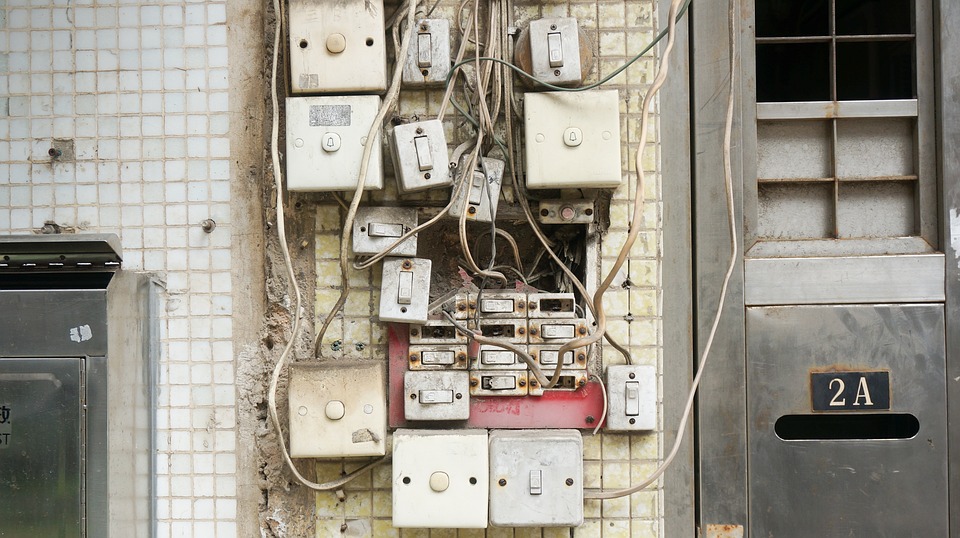The process of buying a new home can be both exciting and scary. While the initial stages of browsing through real estate listings, touring a house, and dreaming about your future can be fun, you’ll also want to make sure that you’re investing in a worthy piece of property. To ensure you aren’t buying into a ‘money pit’ of problems, it’s essential to have a thorough home inspection performed as a part of the home buying process. Before signing on the dotted line or moving into your new home, here are some common issues found in inspections that might need to be addressed:
1. Bad Wiring
From dated knob-and-tube wiring to inadequate fuse boxes to open junction boxes, inspectors can uncover all sorts of wiring problems during a home inspection. While some don’t pose a serious threat, others could greatly increase the risk of an electrical fire. Because dealing with electrical issues can be dangerous, and even deadly, it’s best to hire a professional electrician who knows what they are doing! As Malco Electric points out, this is especially true in a high-tech city like Austin where new smart home technology must be fused into existing wiring. Protect your family and home from the dangers of electric problems by calling in a licensed expert.

2. Faulty Gutters
Although repairing a gutter isn’t typically an expensive fix, working gutters are essential to maintaining the value of your home. According to CenTex Gutters, a clogged, bent, or broken gutter can cause significant damage to your foundation, walls, ceiling, and landscaping. A properly installed and functioning gutter system can last for up to two decades and will protect your home from rain damage.
3. Damp Basements
Basements tend to be a hotspot for home inspection comments. Given their underground location, basements are especially prone to water, mold, and mildew. Thanks to the Texas’ limestone bedrock and high water table, most homes in Texas don’t have basements, so it’s unlikely that this will be an issue you have to contend with.
4. Roof Issues
Another expensive issue to consider is your home’s roof. Shingles tend to curl, blow away, or become brittle over time, which could expose your home to damage during a heavy rain or snow storm (unlikely in Austin, TX!). If the roof is looking a little worse for wear, it may be time to replace or rebuild missing shingles to protect the integrity of your home. When selecting a roofing contractor, Austin’s Kidd Roofing suggests requesting proof of insurance, licensing information (if applicable), and references from existing customers. Repairing a roof is an expensive investment in your home, so you want to make sure it’s done properly by trained professionals.
5. Defective HVAC System
During Texas’ scorching summer months, it’s pretty near impossible to survive without a properly functioning HVAC system. An HVAC inspection is not only crucial to identify any necessary repairs to the existing system, but could also save your life by detecting a faulty heat exchanger. Small holes in the heat exchanger can allow carbon monoxide to escape into your home. This odorless and colorless gas can cause carbon monoxide poisoning or even death. In addition to HVAC inspections and routine maintenance, the HVAC experts at Strand Brothers recommend installing a carbon monoxide detector to ensure your family’s safety.
6. Troublesome Plumbing
Home inspectors consider plumbing to be of primary concern because of the myriad issues it can cause when it goes awry. Inadequate water pressure, leaks that cause mold or drywall damage, slow or clogged drains, and broken toilets are just a few of the things your inspector will look for during his review. While some repairs may be simple enough for a DIY fix, others may necessitate calling in the pros. As Wilson Plumbing points out, trying to correct a complicated issue yourself could result in a bigger headache (and more money to fix it!) down the road.

7. Foundational Flaws
One of the biggest deal breakers that an inspector can find is a flawed foundation. Serious cracks or sinking are huge issues that may not be visible at first glance. The discovery of small cracks in the walls, sagging floors, and doors and windows that stick could all indicate foundational flaws. According to Dawson Foundation Repair, Central Texas has a high degree of soil instability, which means that foundation issues are fairly common. Solutions may be as simple as filling cracks with caulking or as expensive as putting new supports in the foundational structure, depending on the severity of the damage.
As you go through the home inspection process, make sure that you take time to speak with the inspector about each of these common issues. While it is likely that at least something minor will crop up on your home’s inspection report, not all repairs are necessarily deal breakers. By enlisting the help of local home repair experts, you can better assess the extent of needed repairs and determine if this particular house is the right one for you.
Do you need help with packing, unpacking, storage, or your entire move?
Request a free rapid quote for any moving services you may need. Get started today!




